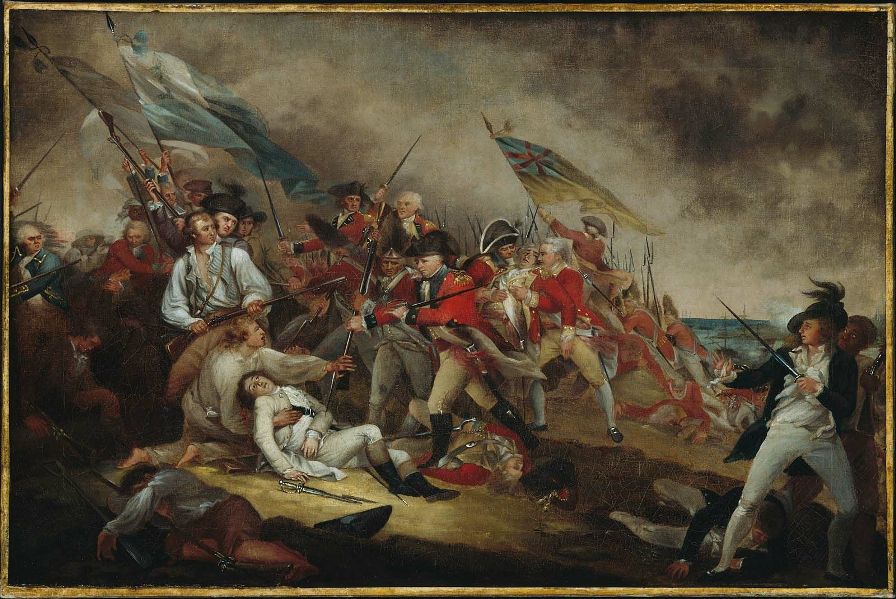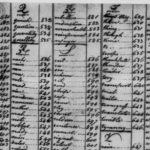
John Trumbull, The Death of General Warren at the Battle of Bunker’s Hill, June 17,1775,1786, oil on canvas. Knowlton is shown in the white shirt holding a musket – Boston Museum of Fine Arts
Revolution and the New Nation (1754–1820s)
Connecticut played a vital role in the forging of our new nation politically, socially, economically, and militarily. Through a period characterized by conflict, Connecticut provided arms, food, and other provisions to undersupplied armies, as well as leadership in government. While largely spared from British occupation and major battles during the American Revolution, Connecticut still experienced British raids and town burnings. When hostilities erupted with Great Britain again during the War of 1812, the state survived blockades on New London and assaults on Essex and Stonington. Connecticut even hosted delegates from its New England neighbors at the Hartford Convention in December 1814 to draft formal opposition to the War of 1812.
Connecticut representatives played crucial roles in the development of the country’s foundational documents like the Declaration of Independence, the Articles of Confederation, and the Constitution of the United States. Connecticut passed its own new state Constitution in 1818, notably removing state support from the Congregational Church. As the young country grappled with the meaning of freedom and application of representative democracy, Connecticut still limited the right to vote to white men and thousands of people remained enslaved in the state. In 1784, Connecticut passed a gradual abolition act that eventually emancipated all enslaved people born after March 1, 1784.
Featured
Caleb Brewster used his knowledge of Long Island Sound to serve as a member of the Culper Spy Ring during the Revolutionary War. …[more]
Learn More
58529
4VRPXHHR
1
apsa
50
default
45708
https://connecticuthistory.org/wp-content/plugins/zotpress/
%7B%22status%22%3A%22success%22%2C%22updateneeded%22%3Afalse%2C%22instance%22%3Afalse%2C%22meta%22%3A%7B%22request_last%22%3A0%2C%22request_next%22%3A0%2C%22used_cache%22%3Atrue%7D%2C%22data%22%3A%5B%7B%22key%22%3A%22QNVRBUDQ%22%2C%22library%22%3A%7B%22id%22%3A58529%7D%2C%22meta%22%3A%7B%22lastModifiedByUser%22%3A%7B%22id%22%3A14399323%2C%22username%22%3A%22kquotap%22%2C%22name%22%3A%22%22%2C%22links%22%3A%7B%22alternate%22%3A%7B%22href%22%3A%22https%3A%5C%2F%5C%2Fwww.zotero.org%5C%2Fkquotap%22%2C%22type%22%3A%22text%5C%2Fhtml%22%7D%7D%7D%2C%22creatorSummary%22%3A%22Normen%22%2C%22parsedDate%22%3A%222021%22%2C%22numChildren%22%3A0%7D%2C%22bib%22%3A%22%3Cdiv%20class%3D%5C%22csl-bib-body%5C%22%20style%3D%5C%22line-height%3A%201.35%3B%20padding-left%3A%201em%3B%20text-indent%3A-1em%3B%5C%22%3E%5Cn%20%20%3Cdiv%20class%3D%5C%22csl-entry%5C%22%3ENormen%2C%20Elizabeth%20J.%202021.%20%26%23x201C%3BThe%20Mohegan%20Petition%20in%201789%3A%20%26%23x2018%3BOne%20Dish%20and%20One%20Fire%20Will%20Not%20Do.%26%23x2019%3B%26%23x201D%3B%20%3Ci%3EConnecticut%20Explored%3C%5C%2Fi%3E.%20%3Ca%20class%3D%27zp-ItemURL%27%20href%3D%27https%3A%5C%2F%5C%2Fwww.ctexplored.org%5C%2Fthe-mohegan-petition-of-1789-one-dish-and-one-fire-will-not-do%5C%2F%27%3Ehttps%3A%5C%2F%5C%2Fwww.ctexplored.org%5C%2Fthe-mohegan-petition-of-1789-one-dish-and-one-fire-will-not-do%5C%2F%3C%5C%2Fa%3E.%3C%5C%2Fdiv%3E%5Cn%3C%5C%2Fdiv%3E%22%2C%22data%22%3A%7B%22itemType%22%3A%22magazineArticle%22%2C%22title%22%3A%22The%20Mohegan%20Petition%20in%201789%3A%20%5C%22One%20Dish%20and%20One%20Fire%20Will%20Not%20Do%5C%22%22%2C%22creators%22%3A%5B%7B%22creatorType%22%3A%22author%22%2C%22firstName%22%3A%22Elizabeth%20J.%22%2C%22lastName%22%3A%22Normen%22%7D%5D%2C%22abstractNote%22%3A%22%22%2C%22date%22%3A%22Spring%202021%22%2C%22ISSN%22%3A%22%22%2C%22DOI%22%3A%22%22%2C%22citationKey%22%3A%22%22%2C%22url%22%3A%22https%3A%5C%2F%5C%2Fwww.ctexplored.org%5C%2Fthe-mohegan-petition-of-1789-one-dish-and-one-fire-will-not-do%5C%2F%22%2C%22language%22%3A%22%22%2C%22collections%22%3A%5B%22XBJEGJ7T%22%2C%224VRPXHHR%22%5D%2C%22dateModified%22%3A%222024-06-25T18%3A27%3A40Z%22%7D%7D%2C%7B%22key%22%3A%22NKVBWF5H%22%2C%22library%22%3A%7B%22id%22%3A58529%7D%2C%22meta%22%3A%7B%22lastModifiedByUser%22%3A%7B%22id%22%3A14399323%2C%22username%22%3A%22kquotap%22%2C%22name%22%3A%22%22%2C%22links%22%3A%7B%22alternate%22%3A%7B%22href%22%3A%22https%3A%5C%2F%5C%2Fwww.zotero.org%5C%2Fkquotap%22%2C%22type%22%3A%22text%5C%2Fhtml%22%7D%7D%7D%2C%22parsedDate%22%3A%222018%22%2C%22numChildren%22%3A0%7D%2C%22bib%22%3A%22%3Cdiv%20class%3D%5C%22csl-bib-body%5C%22%20style%3D%5C%22line-height%3A%201.35%3B%20padding-left%3A%201em%3B%20text-indent%3A-1em%3B%5C%22%3E%5Cn%20%20%3Cdiv%20class%3D%5C%22csl-entry%5C%22%3E%26%23x201C%3B200th%20Anniversary%20of%20the%20Constitution%20of%201818.%26%23x201D%3B%202018.%20%3Ci%3EConnecticut%20Explored%3C%5C%2Fi%3E%2016%284%29.%20%3Ca%20class%3D%27zp-ItemURL%27%20href%3D%27https%3A%5C%2F%5C%2Fwww.ctexplored.org%5C%2Ffall-2018-200th-anniversary-of-the-constitution-of-1818%5C%2F%27%3Ehttps%3A%5C%2F%5C%2Fwww.ctexplored.org%5C%2Ffall-2018-200th-anniversary-of-the-constitution-of-1818%5C%2F%3C%5C%2Fa%3E.%3C%5C%2Fdiv%3E%5Cn%3C%5C%2Fdiv%3E%22%2C%22data%22%3A%7B%22itemType%22%3A%22magazineArticle%22%2C%22title%22%3A%22200th%20Anniversary%20of%20the%20Constitution%20of%201818%22%2C%22creators%22%3A%5B%5D%2C%22abstractNote%22%3A%22%22%2C%22date%22%3A%22Fall%202018%22%2C%22ISSN%22%3A%22%22%2C%22DOI%22%3A%22%22%2C%22citationKey%22%3A%22%22%2C%22url%22%3A%22https%3A%5C%2F%5C%2Fwww.ctexplored.org%5C%2Ffall-2018-200th-anniversary-of-the-constitution-of-1818%5C%2F%22%2C%22language%22%3A%22%22%2C%22collections%22%3A%5B%22XBJEGJ7T%22%2C%224VRPXHHR%22%2C%22N3AD38ZM%22%5D%2C%22dateModified%22%3A%222024-06-25T18%3A26%3A38Z%22%7D%7D%2C%7B%22key%22%3A%22DWHPDI9X%22%2C%22library%22%3A%7B%22id%22%3A58529%7D%2C%22meta%22%3A%7B%22lastModifiedByUser%22%3A%7B%22id%22%3A14399323%2C%22username%22%3A%22kquotap%22%2C%22name%22%3A%22%22%2C%22links%22%3A%7B%22alternate%22%3A%7B%22href%22%3A%22https%3A%5C%2F%5C%2Fwww.zotero.org%5C%2Fkquotap%22%2C%22type%22%3A%22text%5C%2Fhtml%22%7D%7D%7D%2C%22creatorSummary%22%3A%22Schecter%22%2C%22parsedDate%22%3A%222006%22%2C%22numChildren%22%3A0%7D%2C%22bib%22%3A%22%3Cdiv%20class%3D%5C%22csl-bib-body%5C%22%20style%3D%5C%22line-height%3A%201.35%3B%20padding-left%3A%201em%3B%20text-indent%3A-1em%3B%5C%22%3E%5Cn%20%20%3Cdiv%20class%3D%5C%22csl-entry%5C%22%3ESchecter%2C%20Barnet.%202006.%20%26%23x201C%3BJohn%20Trumbull%3A%20Picturing%20the%20Birth%20of%20a%20Nation.%26%23x201D%3B%20%3Ci%3EConnecticut%20Explored%3C%5C%2Fi%3E.%20%3Ca%20class%3D%27zp-ItemURL%27%20href%3D%27https%3A%5C%2F%5C%2Fwww.ctexplored.org%5C%2Fjohn-trumbull-picturing-the-birth-of-a-nation%5C%2F%27%3Ehttps%3A%5C%2F%5C%2Fwww.ctexplored.org%5C%2Fjohn-trumbull-picturing-the-birth-of-a-nation%5C%2F%3C%5C%2Fa%3E.%3C%5C%2Fdiv%3E%5Cn%3C%5C%2Fdiv%3E%22%2C%22data%22%3A%7B%22itemType%22%3A%22magazineArticle%22%2C%22title%22%3A%22John%20Trumbull%3A%20Picturing%20the%20Birth%20of%20a%20Nation%22%2C%22creators%22%3A%5B%7B%22creatorType%22%3A%22author%22%2C%22firstName%22%3A%22Barnet%22%2C%22lastName%22%3A%22Schecter%22%7D%5D%2C%22abstractNote%22%3A%22%22%2C%22date%22%3A%22Winter%202006%5C%2F2007%22%2C%22ISSN%22%3A%22%22%2C%22DOI%22%3A%22%22%2C%22citationKey%22%3A%22%22%2C%22url%22%3A%22https%3A%5C%2F%5C%2Fwww.ctexplored.org%5C%2Fjohn-trumbull-picturing-the-birth-of-a-nation%5C%2F%22%2C%22language%22%3A%22%22%2C%22collections%22%3A%5B%22XBJEGJ7T%22%2C%224VRPXHHR%22%5D%2C%22dateModified%22%3A%222024-06-25T18%3A25%3A53Z%22%7D%7D%2C%7B%22key%22%3A%22M3ANNQIS%22%2C%22library%22%3A%7B%22id%22%3A58529%7D%2C%22meta%22%3A%7B%22lastModifiedByUser%22%3A%7B%22id%22%3A14399323%2C%22username%22%3A%22kquotap%22%2C%22name%22%3A%22%22%2C%22links%22%3A%7B%22alternate%22%3A%7B%22href%22%3A%22https%3A%5C%2F%5C%2Fwww.zotero.org%5C%2Fkquotap%22%2C%22type%22%3A%22text%5C%2Fhtml%22%7D%7D%7D%2C%22creatorSummary%22%3A%22Normen%22%2C%22parsedDate%22%3A%222022%22%2C%22numChildren%22%3A0%7D%2C%22bib%22%3A%22%3Cdiv%20class%3D%5C%22csl-bib-body%5C%22%20style%3D%5C%22line-height%3A%201.35%3B%20padding-left%3A%201em%3B%20text-indent%3A-1em%3B%5C%22%3E%5Cn%20%20%3Cdiv%20class%3D%5C%22csl-entry%5C%22%3ENormen%2C%20Elizabeth%20J.%202022.%20%26%23x201C%3BGeorge%20Washington%20in%20Connecticut.%26%23x201D%3B%20%3Ci%3EConnecticut%20Explored%3C%5C%2Fi%3E.%20%3Ca%20class%3D%27zp-ItemURL%27%20href%3D%27https%3A%5C%2F%5C%2Fwww.ctexplored.org%5C%2Fgeorge-washington-in-connecticut%5C%2F%27%3Ehttps%3A%5C%2F%5C%2Fwww.ctexplored.org%5C%2Fgeorge-washington-in-connecticut%5C%2F%3C%5C%2Fa%3E.%3C%5C%2Fdiv%3E%5Cn%3C%5C%2Fdiv%3E%22%2C%22data%22%3A%7B%22itemType%22%3A%22magazineArticle%22%2C%22title%22%3A%22George%20Washington%20in%20Connecticut%22%2C%22creators%22%3A%5B%7B%22creatorType%22%3A%22author%22%2C%22firstName%22%3A%22Elizabeth%20J.%22%2C%22lastName%22%3A%22Normen%22%7D%5D%2C%22abstractNote%22%3A%22%22%2C%22date%22%3A%22Summer%202022%22%2C%22ISSN%22%3A%22%22%2C%22DOI%22%3A%22%22%2C%22citationKey%22%3A%22%22%2C%22url%22%3A%22https%3A%5C%2F%5C%2Fwww.ctexplored.org%5C%2Fgeorge-washington-in-connecticut%5C%2F%22%2C%22language%22%3A%22%22%2C%22collections%22%3A%5B%22XBJEGJ7T%22%2C%224VRPXHHR%22%5D%2C%22dateModified%22%3A%222024-06-25T18%3A24%3A54Z%22%7D%7D%2C%7B%22key%22%3A%22UPSN86SF%22%2C%22library%22%3A%7B%22id%22%3A58529%7D%2C%22meta%22%3A%7B%22lastModifiedByUser%22%3A%7B%22id%22%3A14399323%2C%22username%22%3A%22kquotap%22%2C%22name%22%3A%22%22%2C%22links%22%3A%7B%22alternate%22%3A%7B%22href%22%3A%22https%3A%5C%2F%5C%2Fwww.zotero.org%5C%2Fkquotap%22%2C%22type%22%3A%22text%5C%2Fhtml%22%7D%7D%7D%2C%22parsedDate%22%3A%221784%22%2C%22numChildren%22%3A0%7D%2C%22bib%22%3A%22%3Cdiv%20class%3D%5C%22csl-bib-body%5C%22%20style%3D%5C%22line-height%3A%201.35%3B%20padding-left%3A%201em%3B%20text-indent%3A-1em%3B%5C%22%3E%5Cn%20%20%3Cdiv%20class%3D%5C%22csl-entry%5C%22%3E%26%23x201C%3BActs%20and%20Laws%20of%20the%20State%20of%20Connecticut%20in%20America.%26%23x201D%3B%201784.%20%3Ca%20class%3D%27zp-ItemURL%27%20href%3D%27https%3A%5C%2F%5C%2Farchives.library.wcsu.edu%5C%2Fomeka%5C%2Fitems%5C%2Fshow%5C%2F2625%27%3Ehttps%3A%5C%2F%5C%2Farchives.library.wcsu.edu%5C%2Fomeka%5C%2Fitems%5C%2Fshow%5C%2F2625%3C%5C%2Fa%3E.%3C%5C%2Fdiv%3E%5Cn%3C%5C%2Fdiv%3E%22%2C%22data%22%3A%7B%22itemType%22%3A%22document%22%2C%22title%22%3A%22Acts%20and%20laws%20of%20the%20State%20of%20Connecticut%20in%20America%22%2C%22creators%22%3A%5B%5D%2C%22abstractNote%22%3A%22%22%2C%22type%22%3A%22%22%2C%22date%22%3A%221784%22%2C%22DOI%22%3A%22%22%2C%22citationKey%22%3A%22%22%2C%22url%22%3A%22https%3A%5C%2F%5C%2Farchives.library.wcsu.edu%5C%2Fomeka%5C%2Fitems%5C%2Fshow%5C%2F2625%22%2C%22language%22%3A%22%22%2C%22collections%22%3A%5B%224VRPXHHR%22%2C%22JKJHJJ73%22%5D%2C%22dateModified%22%3A%222024-06-25T18%3A20%3A33Z%22%7D%7D%2C%7B%22key%22%3A%22IS2EMJP8%22%2C%22library%22%3A%7B%22id%22%3A58529%7D%2C%22meta%22%3A%7B%22lastModifiedByUser%22%3A%7B%22id%22%3A14399323%2C%22username%22%3A%22kquotap%22%2C%22name%22%3A%22%22%2C%22links%22%3A%7B%22alternate%22%3A%7B%22href%22%3A%22https%3A%5C%2F%5C%2Fwww.zotero.org%5C%2Fkquotap%22%2C%22type%22%3A%22text%5C%2Fhtml%22%7D%7D%7D%2C%22creatorSummary%22%3A%22Johnston%22%2C%22parsedDate%22%3A%221889%22%2C%22numChildren%22%3A0%7D%2C%22bib%22%3A%22%3Cdiv%20class%3D%5C%22csl-bib-body%5C%22%20style%3D%5C%22line-height%3A%201.35%3B%20padding-left%3A%201em%3B%20text-indent%3A-1em%3B%5C%22%3E%5Cn%20%20%3Cdiv%20class%3D%5C%22csl-entry%5C%22%3EJohnston%2C%20Henry%20P.%2C%20ed.%201889.%20%3Ci%3EThe%20Record%20of%20Connecticut%20Men%20in%20the%20Military%20and%20Naval%20Service%20during%20the%20War%20of%20the%20Revolution%2C%201775-1783%3C%5C%2Fi%3E.%20Hartford%3A%20The%20Case%2C%20Lockwood%20%26amp%3B%20Brainard%20Company%20Printers%20and%20Binders.%20%3Ca%20class%3D%27zp-ItemURL%27%20href%3D%27https%3A%5C%2F%5C%2Farchive.org%5C%2Fdetails%5C%2Fwaroftherevolution00recorich%5C%2Fpage%5C%2Fn15%5C%2Fmode%5C%2F2up%27%3Ehttps%3A%5C%2F%5C%2Farchive.org%5C%2Fdetails%5C%2Fwaroftherevolution00recorich%5C%2Fpage%5C%2Fn15%5C%2Fmode%5C%2F2up%3C%5C%2Fa%3E.%3C%5C%2Fdiv%3E%5Cn%3C%5C%2Fdiv%3E%22%2C%22data%22%3A%7B%22itemType%22%3A%22book%22%2C%22title%22%3A%22The%20Record%20of%20Connecticut%20Men%20in%20the%20Military%20and%20Naval%20Service%20during%20the%20War%20of%20the%20Revolution%2C%201775-1783%22%2C%22creators%22%3A%5B%7B%22creatorType%22%3A%22editor%22%2C%22firstName%22%3A%22Henry%20P.%22%2C%22lastName%22%3A%22Johnston%22%7D%5D%2C%22abstractNote%22%3A%22%22%2C%22date%22%3A%221889%22%2C%22originalDate%22%3A%22%22%2C%22originalPublisher%22%3A%22%22%2C%22originalPlace%22%3A%22%22%2C%22format%22%3A%22%22%2C%22ISBN%22%3A%22%22%2C%22DOI%22%3A%22%22%2C%22citationKey%22%3A%22%22%2C%22url%22%3A%22https%3A%5C%2F%5C%2Farchive.org%5C%2Fdetails%5C%2Fwaroftherevolution00recorich%5C%2Fpage%5C%2Fn15%5C%2Fmode%5C%2F2up%22%2C%22ISSN%22%3A%22%22%2C%22language%22%3A%22%22%2C%22collections%22%3A%5B%224VRPXHHR%22%2C%22JKJHJJ73%22%5D%2C%22dateModified%22%3A%222024-06-25T18%3A17%3A53Z%22%7D%7D%2C%7B%22key%22%3A%2278SZDECP%22%2C%22library%22%3A%7B%22id%22%3A58529%7D%2C%22meta%22%3A%7B%22lastModifiedByUser%22%3A%7B%22id%22%3A14399323%2C%22username%22%3A%22kquotap%22%2C%22name%22%3A%22%22%2C%22links%22%3A%7B%22alternate%22%3A%7B%22href%22%3A%22https%3A%5C%2F%5C%2Fwww.zotero.org%5C%2Fkquotap%22%2C%22type%22%3A%22text%5C%2Fhtml%22%7D%7D%7D%2C%22parsedDate%22%3A%221899%22%2C%22numChildren%22%3A0%7D%2C%22bib%22%3A%22%3Cdiv%20class%3D%5C%22csl-bib-body%5C%22%20style%3D%5C%22line-height%3A%201.35%3B%20padding-left%3A%201em%3B%20text-indent%3A-1em%3B%5C%22%3E%5Cn%20%20%3Cdiv%20class%3D%5C%22csl-entry%5C%22%3E%3Ci%3EOrderly%20Book%20and%20Journals%20Kept%20By%20Connecticut%20Men%20While%20Taking%20Part%20in%20the%20American%20Revolution%2C%201775-1778%3C%5C%2Fi%3E.%201899.%20VII%20Hartford%3A%20Connecticut%20Historical%20Society.%20%3Ca%20class%3D%27zp-ItemURL%27%20href%3D%27https%3A%5C%2F%5C%2Farchive.org%5C%2Fdetails%5C%2Forderlybookjourn00connrich%5C%2Fpage%5C%2Fn9%5C%2Fmode%5C%2F2up%27%3Ehttps%3A%5C%2F%5C%2Farchive.org%5C%2Fdetails%5C%2Forderlybookjourn00connrich%5C%2Fpage%5C%2Fn9%5C%2Fmode%5C%2F2up%3C%5C%2Fa%3E.%3C%5C%2Fdiv%3E%5Cn%3C%5C%2Fdiv%3E%22%2C%22data%22%3A%7B%22itemType%22%3A%22book%22%2C%22title%22%3A%22Orderly%20Book%20and%20Journals%20Kept%20By%20Connecticut%20Men%20While%20Taking%20Part%20in%20the%20American%20Revolution%2C%201775-1778%22%2C%22creators%22%3A%5B%5D%2C%22abstractNote%22%3A%22%22%2C%22date%22%3A%221899%22%2C%22originalDate%22%3A%22%22%2C%22originalPublisher%22%3A%22%22%2C%22originalPlace%22%3A%22%22%2C%22format%22%3A%22%22%2C%22ISBN%22%3A%22%22%2C%22DOI%22%3A%22%22%2C%22citationKey%22%3A%22%22%2C%22url%22%3A%22https%3A%5C%2F%5C%2Farchive.org%5C%2Fdetails%5C%2Forderlybookjourn00connrich%5C%2Fpage%5C%2Fn9%5C%2Fmode%5C%2F2up%22%2C%22ISSN%22%3A%22%22%2C%22language%22%3A%22%22%2C%22collections%22%3A%5B%224VRPXHHR%22%2C%22JKJHJJ73%22%5D%2C%22dateModified%22%3A%222024-06-25T18%3A13%3A44Z%22%7D%7D%2C%7B%22key%22%3A%22E8J4RMN2%22%2C%22library%22%3A%7B%22id%22%3A58529%7D%2C%22meta%22%3A%7B%22lastModifiedByUser%22%3A%7B%22id%22%3A14399323%2C%22username%22%3A%22kquotap%22%2C%22name%22%3A%22%22%2C%22links%22%3A%7B%22alternate%22%3A%7B%22href%22%3A%22https%3A%5C%2F%5C%2Fwww.zotero.org%5C%2Fkquotap%22%2C%22type%22%3A%22text%5C%2Fhtml%22%7D%7D%7D%2C%22creatorSummary%22%3A%22Grundset%22%2C%22parsedDate%22%3A%222008%22%2C%22numChildren%22%3A0%7D%2C%22bib%22%3A%22%3Cdiv%20class%3D%5C%22csl-bib-body%5C%22%20style%3D%5C%22line-height%3A%201.35%3B%20padding-left%3A%201em%3B%20text-indent%3A-1em%3B%5C%22%3E%5Cn%20%20%3Cdiv%20class%3D%5C%22csl-entry%5C%22%3EGrundset%2C%20Eric%20G.%2C%20ed.%202008.%20%26%23x201C%3BForgotten%20Patriots%3A%20African%20American%20and%20American%20Indian%20Patriots%20in%20the%20Revolutionary%20War.%26%23x201D%3B%20%3Ca%20class%3D%27zp-ItemURL%27%20href%3D%27https%3A%5C%2F%5C%2Fwww.dar.org%5C%2Fsites%5C%2Fdefault%5C%2Ffiles%5C%2Fmedia%5C%2Flibrary%5C%2FDARpublications%5C%2FForgotten_Patriots_ISBN-978-1-892237-10-1.pdf%27%3Ehttps%3A%5C%2F%5C%2Fwww.dar.org%5C%2Fsites%5C%2Fdefault%5C%2Ffiles%5C%2Fmedia%5C%2Flibrary%5C%2FDARpublications%5C%2FForgotten_Patriots_ISBN-978-1-892237-10-1.pdf%3C%5C%2Fa%3E.%3C%5C%2Fdiv%3E%5Cn%3C%5C%2Fdiv%3E%22%2C%22data%22%3A%7B%22itemType%22%3A%22document%22%2C%22title%22%3A%22Forgotten%20Patriots%3A%20African%20American%20and%20American%20Indian%20Patriots%20in%20the%20Revolutionary%20War%22%2C%22creators%22%3A%5B%7B%22creatorType%22%3A%22editor%22%2C%22firstName%22%3A%22Eric%20G.%22%2C%22lastName%22%3A%22Grundset%22%7D%5D%2C%22abstractNote%22%3A%22%22%2C%22type%22%3A%22%22%2C%22date%22%3A%222008%22%2C%22DOI%22%3A%22%22%2C%22citationKey%22%3A%22%22%2C%22url%22%3A%22https%3A%5C%2F%5C%2Fwww.dar.org%5C%2Fsites%5C%2Fdefault%5C%2Ffiles%5C%2Fmedia%5C%2Flibrary%5C%2FDARpublications%5C%2FForgotten_Patriots_ISBN-978-1-892237-10-1.pdf%22%2C%22language%22%3A%22%22%2C%22collections%22%3A%5B%224VRPXHHR%22%2C%22JKJHJJ73%22%5D%2C%22dateModified%22%3A%222024-06-25T18%3A10%3A22Z%22%7D%7D%2C%7B%22key%22%3A%22Z96CH3UQ%22%2C%22library%22%3A%7B%22id%22%3A58529%7D%2C%22meta%22%3A%7B%22lastModifiedByUser%22%3A%7B%22id%22%3A14399323%2C%22username%22%3A%22kquotap%22%2C%22name%22%3A%22%22%2C%22links%22%3A%7B%22alternate%22%3A%7B%22href%22%3A%22https%3A%5C%2F%5C%2Fwww.zotero.org%5C%2Fkquotap%22%2C%22type%22%3A%22text%5C%2Fhtml%22%7D%7D%7D%2C%22numChildren%22%3A0%7D%2C%22bib%22%3A%22%3Cdiv%20class%3D%5C%22csl-bib-body%5C%22%20style%3D%5C%22line-height%3A%201.35%3B%20padding-left%3A%201em%3B%20text-indent%3A-1em%3B%5C%22%3E%5Cn%20%20%3Cdiv%20class%3D%5C%22csl-entry%5C%22%3E%26%23x201C%3BFrench%20and%20Indian%20War%20Collection%2C%201743-1763.%26%23x201D%3B%20%3Ci%3EConnecticut%20Historical%20Society%20Museum%20%26amp%3B%20Library%3C%5C%2Fi%3E.%20%3Ca%20class%3D%27zp-ItemURL%27%20href%3D%27https%3A%5C%2F%5C%2Fdigitalcatalog.chs.org%5C%2Fislandora%5C%2Fobject%5C%2F40002%253AFrenchIndian%27%3Ehttps%3A%5C%2F%5C%2Fdigitalcatalog.chs.org%5C%2Fislandora%5C%2Fobject%5C%2F40002%253AFrenchIndian%3C%5C%2Fa%3E.%3C%5C%2Fdiv%3E%5Cn%3C%5C%2Fdiv%3E%22%2C%22data%22%3A%7B%22itemType%22%3A%22webpage%22%2C%22title%22%3A%22French%20and%20Indian%20War%20Collection%2C%201743-1763%22%2C%22creators%22%3A%5B%5D%2C%22abstractNote%22%3A%22%22%2C%22date%22%3A%22%22%2C%22DOI%22%3A%22%22%2C%22citationKey%22%3A%22%22%2C%22url%22%3A%22https%3A%5C%2F%5C%2Fdigitalcatalog.chs.org%5C%2Fislandora%5C%2Fobject%5C%2F40002%253AFrenchIndian%22%2C%22language%22%3A%22%22%2C%22collections%22%3A%5B%224VRPXHHR%22%2C%22789ZVDE5%22%5D%2C%22dateModified%22%3A%222024-06-25T18%3A05%3A47Z%22%7D%7D%2C%7B%22key%22%3A%22ATDQ48QJ%22%2C%22library%22%3A%7B%22id%22%3A58529%7D%2C%22meta%22%3A%7B%22lastModifiedByUser%22%3A%7B%22id%22%3A14399323%2C%22username%22%3A%22kquotap%22%2C%22name%22%3A%22%22%2C%22links%22%3A%7B%22alternate%22%3A%7B%22href%22%3A%22https%3A%5C%2F%5C%2Fwww.zotero.org%5C%2Fkquotap%22%2C%22type%22%3A%22text%5C%2Fhtml%22%7D%7D%7D%2C%22numChildren%22%3A0%7D%2C%22bib%22%3A%22%3Cdiv%20class%3D%5C%22csl-bib-body%5C%22%20style%3D%5C%22line-height%3A%201.35%3B%20padding-left%3A%201em%3B%20text-indent%3A-1em%3B%5C%22%3E%5Cn%20%20%3Cdiv%20class%3D%5C%22csl-entry%5C%22%3E%26%23x201C%3BAmerican%20Revolution%20%28CHI%20Featured%20Topics%29.%26%23x201D%3B%20%3Ci%3EConnecticut%20Digital%20Archive%3C%5C%2Fi%3E.%20%3Ca%20class%3D%27zp-ItemURL%27%20href%3D%27http%3A%5C%2F%5C%2Fhdl.handle.net%5C%2F11134%5C%2F750006%3AAmericanRevolution%27%3Ehttp%3A%5C%2F%5C%2Fhdl.handle.net%5C%2F11134%5C%2F750006%3AAmericanRevolution%3C%5C%2Fa%3E.%3C%5C%2Fdiv%3E%5Cn%3C%5C%2Fdiv%3E%22%2C%22data%22%3A%7B%22itemType%22%3A%22webpage%22%2C%22title%22%3A%22American%20Revolution%20%28CHI%20Featured%20Topics%29%22%2C%22creators%22%3A%5B%5D%2C%22abstractNote%22%3A%22%22%2C%22date%22%3A%22%22%2C%22DOI%22%3A%22%22%2C%22citationKey%22%3A%22%22%2C%22url%22%3A%22http%3A%5C%2F%5C%2Fhdl.handle.net%5C%2F11134%5C%2F750006%3AAmericanRevolution%22%2C%22language%22%3A%22%22%2C%22collections%22%3A%5B%224VRPXHHR%22%2C%22789ZVDE5%22%5D%2C%22dateModified%22%3A%222024-06-25T17%3A58%3A35Z%22%7D%7D%2C%7B%22key%22%3A%22A9K84S4D%22%2C%22library%22%3A%7B%22id%22%3A58529%7D%2C%22meta%22%3A%7B%22lastModifiedByUser%22%3A%7B%22id%22%3A14399323%2C%22username%22%3A%22kquotap%22%2C%22name%22%3A%22%22%2C%22links%22%3A%7B%22alternate%22%3A%7B%22href%22%3A%22https%3A%5C%2F%5C%2Fwww.zotero.org%5C%2Fkquotap%22%2C%22type%22%3A%22text%5C%2Fhtml%22%7D%7D%7D%2C%22numChildren%22%3A0%7D%2C%22bib%22%3A%22%3Cdiv%20class%3D%5C%22csl-bib-body%5C%22%20style%3D%5C%22line-height%3A%201.35%3B%20padding-left%3A%201em%3B%20text-indent%3A-1em%3B%5C%22%3E%5Cn%20%20%3Cdiv%20class%3D%5C%22csl-entry%5C%22%3E%26%23x201C%3BConnecticut%20Museum%20of%20Culture%20and%20History%3A%20American%20Revolution.%26%23x201D%3B%20%3Ci%3EConnecticut%20Digital%20Archive%3C%5C%2Fi%3E.%20%3Ca%20class%3D%27zp-ItemURL%27%20href%3D%27https%3A%5C%2F%5C%2Fctdigitalarchive.org%5C%2Fnode%5C%2F3721726%27%3Ehttps%3A%5C%2F%5C%2Fctdigitalarchive.org%5C%2Fnode%5C%2F3721726%3C%5C%2Fa%3E.%3C%5C%2Fdiv%3E%5Cn%3C%5C%2Fdiv%3E%22%2C%22data%22%3A%7B%22itemType%22%3A%22webpage%22%2C%22title%22%3A%22Connecticut%20Museum%20of%20Culture%20and%20History%3A%20American%20Revolution%22%2C%22creators%22%3A%5B%5D%2C%22abstractNote%22%3A%22%22%2C%22date%22%3A%22%22%2C%22DOI%22%3A%22%22%2C%22citationKey%22%3A%22%22%2C%22url%22%3A%22https%3A%5C%2F%5C%2Fctdigitalarchive.org%5C%2Fnode%5C%2F3721726%22%2C%22language%22%3A%22%22%2C%22collections%22%3A%5B%224VRPXHHR%22%2C%22789ZVDE5%22%5D%2C%22dateModified%22%3A%222024-06-25T17%3A56%3A20Z%22%7D%7D%2C%7B%22key%22%3A%222CW9JKZA%22%2C%22library%22%3A%7B%22id%22%3A58529%7D%2C%22meta%22%3A%7B%22lastModifiedByUser%22%3A%7B%22id%22%3A14399323%2C%22username%22%3A%22kquotap%22%2C%22name%22%3A%22%22%2C%22links%22%3A%7B%22alternate%22%3A%7B%22href%22%3A%22https%3A%5C%2F%5C%2Fwww.zotero.org%5C%2Fkquotap%22%2C%22type%22%3A%22text%5C%2Fhtml%22%7D%7D%7D%2C%22numChildren%22%3A0%7D%2C%22bib%22%3A%22%3Cdiv%20class%3D%5C%22csl-bib-body%5C%22%20style%3D%5C%22line-height%3A%201.35%3B%20padding-left%3A%201em%3B%20text-indent%3A-1em%3B%5C%22%3E%5Cn%20%20%3Cdiv%20class%3D%5C%22csl-entry%5C%22%3E%26%23x201C%3BConnecticut%26%23x2019%3Bs%20Western%20Lands%20or%20Western%20Reserve.%26%23x201D%3B%20%3Ci%3EConnecticut%20State%20Library%3C%5C%2Fi%3E.%20%3Ca%20class%3D%27zp-ItemURL%27%20href%3D%27https%3A%5C%2F%5C%2Flibguides.ctstatelibrary.org%5C%2Fhg%5C%2Fmaps%5C%2Fwesternlands%27%3Ehttps%3A%5C%2F%5C%2Flibguides.ctstatelibrary.org%5C%2Fhg%5C%2Fmaps%5C%2Fwesternlands%3C%5C%2Fa%3E.%3C%5C%2Fdiv%3E%5Cn%3C%5C%2Fdiv%3E%22%2C%22data%22%3A%7B%22itemType%22%3A%22webpage%22%2C%22title%22%3A%22Connecticut%27s%20Western%20Lands%20or%20Western%20Reserve%22%2C%22creators%22%3A%5B%5D%2C%22abstractNote%22%3A%22%22%2C%22date%22%3A%22%22%2C%22DOI%22%3A%22%22%2C%22citationKey%22%3A%22%22%2C%22url%22%3A%22https%3A%5C%2F%5C%2Flibguides.ctstatelibrary.org%5C%2Fhg%5C%2Fmaps%5C%2Fwesternlands%22%2C%22language%22%3A%22%22%2C%22collections%22%3A%5B%224VRPXHHR%22%2C%22789ZVDE5%22%5D%2C%22dateModified%22%3A%222024-06-25T17%3A54%3A49Z%22%7D%7D%2C%7B%22key%22%3A%227WP74EZ9%22%2C%22library%22%3A%7B%22id%22%3A58529%7D%2C%22meta%22%3A%7B%22lastModifiedByUser%22%3A%7B%22id%22%3A14399323%2C%22username%22%3A%22kquotap%22%2C%22name%22%3A%22%22%2C%22links%22%3A%7B%22alternate%22%3A%7B%22href%22%3A%22https%3A%5C%2F%5C%2Fwww.zotero.org%5C%2Fkquotap%22%2C%22type%22%3A%22text%5C%2Fhtml%22%7D%7D%7D%2C%22numChildren%22%3A0%7D%2C%22bib%22%3A%22%3Cdiv%20class%3D%5C%22csl-bib-body%5C%22%20style%3D%5C%22line-height%3A%201.35%3B%20padding-left%3A%201em%3B%20text-indent%3A-1em%3B%5C%22%3E%5Cn%20%20%3Cdiv%20class%3D%5C%22csl-entry%5C%22%3E%26%23x201C%3BColonial%20Service%20War%20Records.%26%23x201D%3B%20%3Ci%3EConnecticut%20State%20Library%3C%5C%2Fi%3E.%20%3Ca%20class%3D%27zp-ItemURL%27%20href%3D%27https%3A%5C%2F%5C%2Flibguides.ctstatelibrary.org%5C%2Fhg%5C%2Fmilitaryrecords%5C%2Fcolonialwars%27%3Ehttps%3A%5C%2F%5C%2Flibguides.ctstatelibrary.org%5C%2Fhg%5C%2Fmilitaryrecords%5C%2Fcolonialwars%3C%5C%2Fa%3E.%3C%5C%2Fdiv%3E%5Cn%3C%5C%2Fdiv%3E%22%2C%22data%22%3A%7B%22itemType%22%3A%22webpage%22%2C%22title%22%3A%22Colonial%20Service%20War%20Records%22%2C%22creators%22%3A%5B%5D%2C%22abstractNote%22%3A%22%22%2C%22date%22%3A%22%22%2C%22DOI%22%3A%22%22%2C%22citationKey%22%3A%22%22%2C%22url%22%3A%22https%3A%5C%2F%5C%2Flibguides.ctstatelibrary.org%5C%2Fhg%5C%2Fmilitaryrecords%5C%2Fcolonialwars%22%2C%22language%22%3A%22%22%2C%22collections%22%3A%5B%224VRPXHHR%22%2C%22789ZVDE5%22%5D%2C%22dateModified%22%3A%222024-06-25T17%3A48%3A14Z%22%7D%7D%2C%7B%22key%22%3A%22699XAQKI%22%2C%22library%22%3A%7B%22id%22%3A58529%7D%2C%22meta%22%3A%7B%22lastModifiedByUser%22%3A%7B%22id%22%3A14399323%2C%22username%22%3A%22kquotap%22%2C%22name%22%3A%22%22%2C%22links%22%3A%7B%22alternate%22%3A%7B%22href%22%3A%22https%3A%5C%2F%5C%2Fwww.zotero.org%5C%2Fkquotap%22%2C%22type%22%3A%22text%5C%2Fhtml%22%7D%7D%7D%2C%22numChildren%22%3A0%7D%2C%22bib%22%3A%22%3Cdiv%20class%3D%5C%22csl-bib-body%5C%22%20style%3D%5C%22line-height%3A%201.35%3B%20padding-left%3A%201em%3B%20text-indent%3A-1em%3B%5C%22%3E%5Cn%20%20%3Cdiv%20class%3D%5C%22csl-entry%5C%22%3E%26%23x201C%3BRevolutionary%20War%20Service%20Records.%26%23x201D%3B%20%3Ci%3EConnecticut%20State%20Library%3C%5C%2Fi%3E.%20%3Ca%20class%3D%27zp-ItemURL%27%20href%3D%27https%3A%5C%2F%5C%2Flibguides.ctstatelibrary.org%5C%2Fhg%5C%2Fmilitaryrecords%5C%2Frevwar%27%3Ehttps%3A%5C%2F%5C%2Flibguides.ctstatelibrary.org%5C%2Fhg%5C%2Fmilitaryrecords%5C%2Frevwar%3C%5C%2Fa%3E.%3C%5C%2Fdiv%3E%5Cn%3C%5C%2Fdiv%3E%22%2C%22data%22%3A%7B%22itemType%22%3A%22webpage%22%2C%22title%22%3A%22Revolutionary%20War%20Service%20Records%22%2C%22creators%22%3A%5B%5D%2C%22abstractNote%22%3A%22%22%2C%22date%22%3A%22%22%2C%22DOI%22%3A%22%22%2C%22citationKey%22%3A%22%22%2C%22url%22%3A%22https%3A%5C%2F%5C%2Flibguides.ctstatelibrary.org%5C%2Fhg%5C%2Fmilitaryrecords%5C%2Frevwar%22%2C%22language%22%3A%22%22%2C%22collections%22%3A%5B%224VRPXHHR%22%2C%22789ZVDE5%22%5D%2C%22dateModified%22%3A%222024-06-25T17%3A47%3A37Z%22%7D%7D%2C%7B%22key%22%3A%22IB3S73FP%22%2C%22library%22%3A%7B%22id%22%3A58529%7D%2C%22meta%22%3A%7B%22lastModifiedByUser%22%3A%7B%22id%22%3A14399323%2C%22username%22%3A%22kquotap%22%2C%22name%22%3A%22%22%2C%22links%22%3A%7B%22alternate%22%3A%7B%22href%22%3A%22https%3A%5C%2F%5C%2Fwww.zotero.org%5C%2Fkquotap%22%2C%22type%22%3A%22text%5C%2Fhtml%22%7D%7D%7D%2C%22numChildren%22%3A0%7D%2C%22bib%22%3A%22%3Cdiv%20class%3D%5C%22csl-bib-body%5C%22%20style%3D%5C%22line-height%3A%201.35%3B%20padding-left%3A%201em%3B%20text-indent%3A-1em%3B%5C%22%3E%5Cn%20%20%3Cdiv%20class%3D%5C%22csl-entry%5C%22%3E%26%23x201C%3BConnecticut--History--Revolution%2C%201775-1783.%26%23x201D%3B%20%3Ci%3EArchives%20at%20Yale%3C%5C%2Fi%3E.%20%3Ca%20class%3D%27zp-ItemURL%27%20href%3D%27https%3A%5C%2F%5C%2Farchives.yale.edu%5C%2Fsubjects%5C%2F29321%27%3Ehttps%3A%5C%2F%5C%2Farchives.yale.edu%5C%2Fsubjects%5C%2F29321%3C%5C%2Fa%3E.%3C%5C%2Fdiv%3E%5Cn%3C%5C%2Fdiv%3E%22%2C%22data%22%3A%7B%22itemType%22%3A%22webpage%22%2C%22title%22%3A%22Connecticut--History--Revolution%2C%201775-1783%22%2C%22creators%22%3A%5B%5D%2C%22abstractNote%22%3A%22%22%2C%22date%22%3A%22%22%2C%22DOI%22%3A%22%22%2C%22citationKey%22%3A%22%22%2C%22url%22%3A%22https%3A%5C%2F%5C%2Farchives.yale.edu%5C%2Fsubjects%5C%2F29321%22%2C%22language%22%3A%22%22%2C%22collections%22%3A%5B%224VRPXHHR%22%2C%22789ZVDE5%22%5D%2C%22dateModified%22%3A%222024-06-25T17%3A47%3A08Z%22%7D%7D%2C%7B%22key%22%3A%22Z29GUWNC%22%2C%22library%22%3A%7B%22id%22%3A58529%7D%2C%22meta%22%3A%7B%22lastModifiedByUser%22%3A%7B%22id%22%3A14399323%2C%22username%22%3A%22kquotap%22%2C%22name%22%3A%22%22%2C%22links%22%3A%7B%22alternate%22%3A%7B%22href%22%3A%22https%3A%5C%2F%5C%2Fwww.zotero.org%5C%2Fkquotap%22%2C%22type%22%3A%22text%5C%2Fhtml%22%7D%7D%7D%2C%22numChildren%22%3A0%7D%2C%22bib%22%3A%22%3Cdiv%20class%3D%5C%22csl-bib-body%5C%22%20style%3D%5C%22line-height%3A%201.35%3B%20padding-left%3A%201em%3B%20text-indent%3A-1em%3B%5C%22%3E%5Cn%20%20%3Cdiv%20class%3D%5C%22csl-entry%5C%22%3E%26%23x201C%3BCompiled%20Service%20Records%20of%20Soldiers%20Who%20Served%20in%20the%20American%20Army%20During%20the%20Revolutionary%20War.%26%23x201D%3B%20%3Ci%3ENational%20Archives%3C%5C%2Fi%3E.%20%3Ca%20class%3D%27zp-ItemURL%27%20href%3D%27https%3A%5C%2F%5C%2Fcatalog.archives.gov%5C%2Fsearch-within%5C%2F570910%3Fq%3DConnecticut%27%3Ehttps%3A%5C%2F%5C%2Fcatalog.archives.gov%5C%2Fsearch-within%5C%2F570910%3Fq%3DConnecticut%3C%5C%2Fa%3E.%3C%5C%2Fdiv%3E%5Cn%3C%5C%2Fdiv%3E%22%2C%22data%22%3A%7B%22itemType%22%3A%22webpage%22%2C%22title%22%3A%22Compiled%20Service%20Records%20of%20Soldiers%20Who%20Served%20in%20the%20American%20Army%20During%20the%20Revolutionary%20War%22%2C%22creators%22%3A%5B%5D%2C%22abstractNote%22%3A%22%22%2C%22date%22%3A%22%22%2C%22DOI%22%3A%22%22%2C%22citationKey%22%3A%22%22%2C%22url%22%3A%22https%3A%5C%2F%5C%2Fcatalog.archives.gov%5C%2Fsearch-within%5C%2F570910%3Fq%3DConnecticut%22%2C%22language%22%3A%22%22%2C%22collections%22%3A%5B%224VRPXHHR%22%2C%22789ZVDE5%22%5D%2C%22dateModified%22%3A%222024-06-25T17%3A46%3A34Z%22%7D%7D%2C%7B%22key%22%3A%227X9PQZ8V%22%2C%22library%22%3A%7B%22id%22%3A58529%7D%2C%22meta%22%3A%7B%22lastModifiedByUser%22%3A%7B%22id%22%3A14399323%2C%22username%22%3A%22kquotap%22%2C%22name%22%3A%22%22%2C%22links%22%3A%7B%22alternate%22%3A%7B%22href%22%3A%22https%3A%5C%2F%5C%2Fwww.zotero.org%5C%2Fkquotap%22%2C%22type%22%3A%22text%5C%2Fhtml%22%7D%7D%7D%2C%22numChildren%22%3A0%7D%2C%22bib%22%3A%22%3Cdiv%20class%3D%5C%22csl-bib-body%5C%22%20style%3D%5C%22line-height%3A%201.35%3B%20padding-left%3A%201em%3B%20text-indent%3A-1em%3B%5C%22%3E%5Cn%20%20%3Cdiv%20class%3D%5C%22csl-entry%5C%22%3E%26%23x201C%3BAmerican%20Revolutionary%20War%20Collection%2C%201775-1786.%26%23x201D%3B%20%3Ci%3EConnecticut%26%23x2019%3Bs%20Archives%20Online%3C%5C%2Fi%3E.%20%3Ca%20class%3D%27zp-ItemURL%27%20href%3D%27https%3A%5C%2F%5C%2Farchives.library.wcsu.edu%5C%2FcaoSearch%5C%2Fcatalog%5C%2Fmssa-ms-0674%27%3Ehttps%3A%5C%2F%5C%2Farchives.library.wcsu.edu%5C%2FcaoSearch%5C%2Fcatalog%5C%2Fmssa-ms-0674%3C%5C%2Fa%3E.%3C%5C%2Fdiv%3E%5Cn%3C%5C%2Fdiv%3E%22%2C%22data%22%3A%7B%22itemType%22%3A%22webpage%22%2C%22title%22%3A%22American%20Revolutionary%20War%20collection%2C%201775-1786%22%2C%22creators%22%3A%5B%5D%2C%22abstractNote%22%3A%22%22%2C%22date%22%3A%22%22%2C%22DOI%22%3A%22%22%2C%22citationKey%22%3A%22%22%2C%22url%22%3A%22https%3A%5C%2F%5C%2Farchives.library.wcsu.edu%5C%2FcaoSearch%5C%2Fcatalog%5C%2Fmssa-ms-0674%22%2C%22language%22%3A%22%22%2C%22collections%22%3A%5B%224VRPXHHR%22%2C%22789ZVDE5%22%5D%2C%22dateModified%22%3A%222024-06-25T17%3A45%3A47Z%22%7D%7D%2C%7B%22key%22%3A%22NJ3ZJARA%22%2C%22library%22%3A%7B%22id%22%3A58529%7D%2C%22meta%22%3A%7B%22lastModifiedByUser%22%3A%7B%22id%22%3A14399323%2C%22username%22%3A%22kquotap%22%2C%22name%22%3A%22%22%2C%22links%22%3A%7B%22alternate%22%3A%7B%22href%22%3A%22https%3A%5C%2F%5C%2Fwww.zotero.org%5C%2Fkquotap%22%2C%22type%22%3A%22text%5C%2Fhtml%22%7D%7D%7D%2C%22numChildren%22%3A0%7D%2C%22bib%22%3A%22%3Cdiv%20class%3D%5C%22csl-bib-body%5C%22%20style%3D%5C%22line-height%3A%201.35%3B%20padding-left%3A%201em%3B%20text-indent%3A-1em%3B%5C%22%3E%5Cn%20%20%3Cdiv%20class%3D%5C%22csl-entry%5C%22%3E%26%23x201C%3BWashington-Rochambeau%20Revolutionary%20Route.%26%23x201D%3B%20%3Ci%3ENational%20Park%20Service%3C%5C%2Fi%3E.%20%3Ca%20class%3D%27zp-ItemURL%27%20href%3D%27https%3A%5C%2F%5C%2Fwww.nps.gov%5C%2Fwaro%5C%2Flearn%5C%2Fnews%5C%2Fupload%5C%2FWARO-brochure-both-sides-2.pdf%27%3Ehttps%3A%5C%2F%5C%2Fwww.nps.gov%5C%2Fwaro%5C%2Flearn%5C%2Fnews%5C%2Fupload%5C%2FWARO-brochure-both-sides-2.pdf%3C%5C%2Fa%3E.%3C%5C%2Fdiv%3E%5Cn%3C%5C%2Fdiv%3E%22%2C%22data%22%3A%7B%22itemType%22%3A%22webpage%22%2C%22title%22%3A%22Washington-Rochambeau%20Revolutionary%20Route%22%2C%22creators%22%3A%5B%5D%2C%22abstractNote%22%3A%22%22%2C%22date%22%3A%22%22%2C%22DOI%22%3A%22%22%2C%22citationKey%22%3A%22%22%2C%22url%22%3A%22https%3A%5C%2F%5C%2Fwww.nps.gov%5C%2Fwaro%5C%2Flearn%5C%2Fnews%5C%2Fupload%5C%2FWARO-brochure-both-sides-2.pdf%22%2C%22language%22%3A%22%22%2C%22collections%22%3A%5B%224VRPXHHR%22%2C%22MPM982G4%22%5D%2C%22dateModified%22%3A%222024-06-25T17%3A41%3A07Z%22%7D%7D%2C%7B%22key%22%3A%228AXXVVCS%22%2C%22library%22%3A%7B%22id%22%3A58529%7D%2C%22meta%22%3A%7B%22lastModifiedByUser%22%3A%7B%22id%22%3A14399323%2C%22username%22%3A%22kquotap%22%2C%22name%22%3A%22%22%2C%22links%22%3A%7B%22alternate%22%3A%7B%22href%22%3A%22https%3A%5C%2F%5C%2Fwww.zotero.org%5C%2Fkquotap%22%2C%22type%22%3A%22text%5C%2Fhtml%22%7D%7D%7D%2C%22numChildren%22%3A0%7D%2C%22bib%22%3A%22%3Cdiv%20class%3D%5C%22csl-bib-body%5C%22%20style%3D%5C%22line-height%3A%201.35%3B%20padding-left%3A%201em%3B%20text-indent%3A-1em%3B%5C%22%3E%5Cn%20%20%3Cdiv%20class%3D%5C%22csl-entry%5C%22%3E%26%23x201C%3BSoldiers%20of%20the%20Revolutionary%20War.%26%23x201D%3B%20%3Ci%3EAncient%20Burying%20Ground%20Association%3C%5C%2Fi%3E.%20%3Ca%20class%3D%27zp-ItemURL%27%20href%3D%27https%3A%5C%2F%5C%2Fancientburyingground.com%5C%2Fpioneers%5C%2Frevolution%5C%2Fsoldiers%5C%2F%27%3Ehttps%3A%5C%2F%5C%2Fancientburyingground.com%5C%2Fpioneers%5C%2Frevolution%5C%2Fsoldiers%5C%2F%3C%5C%2Fa%3E.%3C%5C%2Fdiv%3E%5Cn%3C%5C%2Fdiv%3E%22%2C%22data%22%3A%7B%22itemType%22%3A%22webpage%22%2C%22title%22%3A%22Soldiers%20of%20the%20Revolutionary%20War%22%2C%22creators%22%3A%5B%5D%2C%22abstractNote%22%3A%22%22%2C%22date%22%3A%22%22%2C%22DOI%22%3A%22%22%2C%22citationKey%22%3A%22%22%2C%22url%22%3A%22https%3A%5C%2F%5C%2Fancientburyingground.com%5C%2Fpioneers%5C%2Frevolution%5C%2Fsoldiers%5C%2F%22%2C%22language%22%3A%22%22%2C%22collections%22%3A%5B%224VRPXHHR%22%2C%22MPM982G4%22%5D%2C%22dateModified%22%3A%222024-06-25T17%3A40%3A14Z%22%7D%7D%2C%7B%22key%22%3A%226A4VZN9M%22%2C%22library%22%3A%7B%22id%22%3A58529%7D%2C%22meta%22%3A%7B%22lastModifiedByUser%22%3A%7B%22id%22%3A14399323%2C%22username%22%3A%22kquotap%22%2C%22name%22%3A%22%22%2C%22links%22%3A%7B%22alternate%22%3A%7B%22href%22%3A%22https%3A%5C%2F%5C%2Fwww.zotero.org%5C%2Fkquotap%22%2C%22type%22%3A%22text%5C%2Fhtml%22%7D%7D%7D%2C%22numChildren%22%3A0%7D%2C%22bib%22%3A%22%3Cdiv%20class%3D%5C%22csl-bib-body%5C%22%20style%3D%5C%22line-height%3A%201.35%3B%20padding-left%3A%201em%3B%20text-indent%3A-1em%3B%5C%22%3E%5Cn%20%20%3Cdiv%20class%3D%5C%22csl-entry%5C%22%3E%26%23x201C%3BRevolutionary%20Connecticut.%26%23x201D%3B%20%3Ci%3ECT%20Visit%3C%5C%2Fi%3E.%20%3Ca%20class%3D%27zp-ItemURL%27%20href%3D%27https%3A%5C%2F%5C%2Fctvisit.com%5C%2Farticles%5C%2Frevolutionary-connecticut%27%3Ehttps%3A%5C%2F%5C%2Fctvisit.com%5C%2Farticles%5C%2Frevolutionary-connecticut%3C%5C%2Fa%3E.%3C%5C%2Fdiv%3E%5Cn%3C%5C%2Fdiv%3E%22%2C%22data%22%3A%7B%22itemType%22%3A%22webpage%22%2C%22title%22%3A%22Revolutionary%20Connecticut%22%2C%22creators%22%3A%5B%5D%2C%22abstractNote%22%3A%22%22%2C%22date%22%3A%22%22%2C%22DOI%22%3A%22%22%2C%22citationKey%22%3A%22%22%2C%22url%22%3A%22https%3A%5C%2F%5C%2Fctvisit.com%5C%2Farticles%5C%2Frevolutionary-connecticut%22%2C%22language%22%3A%22%22%2C%22collections%22%3A%5B%224VRPXHHR%22%2C%22MPM982G4%22%5D%2C%22dateModified%22%3A%222024-06-25T17%3A39%3A42Z%22%7D%7D%2C%7B%22key%22%3A%2266GB9MXU%22%2C%22library%22%3A%7B%22id%22%3A58529%7D%2C%22meta%22%3A%7B%22lastModifiedByUser%22%3A%7B%22id%22%3A14399323%2C%22username%22%3A%22kquotap%22%2C%22name%22%3A%22%22%2C%22links%22%3A%7B%22alternate%22%3A%7B%22href%22%3A%22https%3A%5C%2F%5C%2Fwww.zotero.org%5C%2Fkquotap%22%2C%22type%22%3A%22text%5C%2Fhtml%22%7D%7D%7D%2C%22numChildren%22%3A0%7D%2C%22bib%22%3A%22%3Cdiv%20class%3D%5C%22csl-bib-body%5C%22%20style%3D%5C%22line-height%3A%201.35%3B%20padding-left%3A%201em%3B%20text-indent%3A-1em%3B%5C%22%3E%5Cn%20%20%3Cdiv%20class%3D%5C%22csl-entry%5C%22%3E%26%23x201C%3BConnecticut%20Freedom%20Trail.%26%23x201D%3B%20%3Ca%20class%3D%27zp-ItemURL%27%20href%3D%27https%3A%5C%2F%5C%2Fctfreedomtrail.org%5C%2F%27%3Ehttps%3A%5C%2F%5C%2Fctfreedomtrail.org%5C%2F%3C%5C%2Fa%3E.%3C%5C%2Fdiv%3E%5Cn%3C%5C%2Fdiv%3E%22%2C%22data%22%3A%7B%22itemType%22%3A%22webpage%22%2C%22title%22%3A%22Connecticut%20Freedom%20Trail%22%2C%22creators%22%3A%5B%5D%2C%22abstractNote%22%3A%22%22%2C%22date%22%3A%22%22%2C%22DOI%22%3A%22%22%2C%22citationKey%22%3A%22%22%2C%22url%22%3A%22https%3A%5C%2F%5C%2Fctfreedomtrail.org%5C%2F%22%2C%22language%22%3A%22%22%2C%22collections%22%3A%5B%224VRPXHHR%22%2C%22MPM982G4%22%5D%2C%22dateModified%22%3A%222024-06-25T17%3A37%3A29Z%22%7D%7D%2C%7B%22key%22%3A%22MGT4IXMC%22%2C%22library%22%3A%7B%22id%22%3A58529%7D%2C%22meta%22%3A%7B%22lastModifiedByUser%22%3A%7B%22id%22%3A14399323%2C%22username%22%3A%22kquotap%22%2C%22name%22%3A%22%22%2C%22links%22%3A%7B%22alternate%22%3A%7B%22href%22%3A%22https%3A%5C%2F%5C%2Fwww.zotero.org%5C%2Fkquotap%22%2C%22type%22%3A%22text%5C%2Fhtml%22%7D%7D%7D%2C%22numChildren%22%3A0%7D%2C%22bib%22%3A%22%3Cdiv%20class%3D%5C%22csl-bib-body%5C%22%20style%3D%5C%22line-height%3A%201.35%3B%20padding-left%3A%201em%3B%20text-indent%3A-1em%3B%5C%22%3E%5Cn%20%20%3Cdiv%20class%3D%5C%22csl-entry%5C%22%3E%26%23x201C%3BConnecticut%20River%20Museum.%26%23x201D%3B%20%3Ca%20class%3D%27zp-ItemURL%27%20href%3D%27http%3A%5C%2F%5C%2Fwww.ctrivermuseum.org%5C%2F%27%3Ehttp%3A%5C%2F%5C%2Fwww.ctrivermuseum.org%5C%2F%3C%5C%2Fa%3E.%3C%5C%2Fdiv%3E%5Cn%3C%5C%2Fdiv%3E%22%2C%22data%22%3A%7B%22itemType%22%3A%22webpage%22%2C%22title%22%3A%22Connecticut%20River%20Museum%22%2C%22creators%22%3A%5B%5D%2C%22abstractNote%22%3A%22%22%2C%22date%22%3A%22%22%2C%22DOI%22%3A%22%22%2C%22citationKey%22%3A%22%22%2C%22url%22%3A%22http%3A%5C%2F%5C%2Fwww.ctrivermuseum.org%5C%2F%22%2C%22language%22%3A%22%22%2C%22collections%22%3A%5B%22G54SK9IN%22%2C%22EWTRTS8P%22%2C%22B7E8NB7Z%22%2C%22UQ6BMA6T%22%2C%22EXCF88IA%22%2C%22V98S3MVS%22%2C%22IUWDK9GE%22%2C%22B2SDC5CT%22%2C%229QPUVCT9%22%2C%22UQ7NQ4JE%22%2C%22BG4RZD2W%22%2C%227D3TARZH%22%2C%22C2XTNRE6%22%2C%22DI77DVM8%22%2C%224VRPXHHR%22%2C%22MPM982G4%22%5D%2C%22dateModified%22%3A%222024-06-25T17%3A36%3A27Z%22%7D%7D%2C%7B%22key%22%3A%225CX6HWKS%22%2C%22library%22%3A%7B%22id%22%3A58529%7D%2C%22meta%22%3A%7B%22lastModifiedByUser%22%3A%7B%22id%22%3A14399323%2C%22username%22%3A%22kquotap%22%2C%22name%22%3A%22%22%2C%22links%22%3A%7B%22alternate%22%3A%7B%22href%22%3A%22https%3A%5C%2F%5C%2Fwww.zotero.org%5C%2Fkquotap%22%2C%22type%22%3A%22text%5C%2Fhtml%22%7D%7D%7D%2C%22numChildren%22%3A1%7D%2C%22bib%22%3A%22%3Cdiv%20class%3D%5C%22csl-bib-body%5C%22%20style%3D%5C%22line-height%3A%201.35%3B%20padding-left%3A%201em%3B%20text-indent%3A-1em%3B%5C%22%3E%5Cn%20%20%3Cdiv%20class%3D%5C%22csl-entry%5C%22%3E%26%23x201C%3BConnecticut%20Museum%20of%20Culture%20and%20History.%26%23x201D%3B%20%3Ca%20class%3D%27zp-ItemURL%27%20href%3D%27https%3A%5C%2F%5C%2Fwww.connecticutmuseum.org%5C%2F%27%3Ehttps%3A%5C%2F%5C%2Fwww.connecticutmuseum.org%5C%2F%3C%5C%2Fa%3E%20%28May%2013%2C%202012%29.%3C%5C%2Fdiv%3E%5Cn%3C%5C%2Fdiv%3E%22%2C%22data%22%3A%7B%22itemType%22%3A%22webpage%22%2C%22title%22%3A%22Connecticut%20Museum%20of%20Culture%20and%20History%22%2C%22creators%22%3A%5B%5D%2C%22abstractNote%22%3A%22%22%2C%22date%22%3A%22%22%2C%22DOI%22%3A%22%22%2C%22citationKey%22%3A%22%22%2C%22url%22%3A%22https%3A%5C%2F%5C%2Fwww.connecticutmuseum.org%5C%2F%22%2C%22language%22%3A%22%22%2C%22collections%22%3A%5B%227ANKVEHM%22%2C%22ZID7ZZJF%22%2C%22IDIGH2FG%22%2C%22BZKV945T%22%2C%22X3R7GNIK%22%2C%226WVM8IQX%22%2C%224VRPXHHR%22%2C%22MPM982G4%22%2C%22Q7VCV2X4%22%2C%22TVAQX9N6%22%5D%2C%22dateModified%22%3A%222024-06-25T17%3A36%3A10Z%22%7D%7D%2C%7B%22key%22%3A%228G8G72BN%22%2C%22library%22%3A%7B%22id%22%3A58529%7D%2C%22meta%22%3A%7B%22lastModifiedByUser%22%3A%7B%22id%22%3A14399323%2C%22username%22%3A%22kquotap%22%2C%22name%22%3A%22%22%2C%22links%22%3A%7B%22alternate%22%3A%7B%22href%22%3A%22https%3A%5C%2F%5C%2Fwww.zotero.org%5C%2Fkquotap%22%2C%22type%22%3A%22text%5C%2Fhtml%22%7D%7D%7D%2C%22numChildren%22%3A0%7D%2C%22bib%22%3A%22%3Cdiv%20class%3D%5C%22csl-bib-body%5C%22%20style%3D%5C%22line-height%3A%201.35%3B%20padding-left%3A%201em%3B%20text-indent%3A-1em%3B%5C%22%3E%5Cn%20%20%3Cdiv%20class%3D%5C%22csl-entry%5C%22%3E%26%23x201C%3BConnecticut%20Lafayette%20Trail%3A%20Commemorating%20General%20Lafayette%26%23x2019%3Bs%20Tour%20of%20Connecticut%20in%201824.%26%23x201D%3B%20%3Ci%3EConnecticut%20Lafayette%20Trail%3C%5C%2Fi%3E.%20%3Ca%20class%3D%27zp-ItemURL%27%20href%3D%27https%3A%5C%2F%5C%2Flafayettecttrail.org%5C%2F%27%3Ehttps%3A%5C%2F%5C%2Flafayettecttrail.org%5C%2F%3C%5C%2Fa%3E.%3C%5C%2Fdiv%3E%5Cn%3C%5C%2Fdiv%3E%22%2C%22data%22%3A%7B%22itemType%22%3A%22webpage%22%2C%22title%22%3A%22Connecticut%20Lafayette%20Trail%3A%20Commemorating%20General%20Lafayette%27s%20Tour%20of%20Connecticut%20in%201824%22%2C%22creators%22%3A%5B%5D%2C%22abstractNote%22%3A%22%22%2C%22date%22%3A%22%22%2C%22DOI%22%3A%22%22%2C%22citationKey%22%3A%22%22%2C%22url%22%3A%22https%3A%5C%2F%5C%2Flafayettecttrail.org%5C%2F%22%2C%22language%22%3A%22%22%2C%22collections%22%3A%5B%224VRPXHHR%22%2C%22K4KZP23K%22%5D%2C%22dateModified%22%3A%222024-06-25T17%3A34%3A41Z%22%7D%7D%2C%7B%22key%22%3A%22464UNZW3%22%2C%22library%22%3A%7B%22id%22%3A58529%7D%2C%22meta%22%3A%7B%22lastModifiedByUser%22%3A%7B%22id%22%3A14399323%2C%22username%22%3A%22kquotap%22%2C%22name%22%3A%22%22%2C%22links%22%3A%7B%22alternate%22%3A%7B%22href%22%3A%22https%3A%5C%2F%5C%2Fwww.zotero.org%5C%2Fkquotap%22%2C%22type%22%3A%22text%5C%2Fhtml%22%7D%7D%7D%2C%22parsedDate%22%3A%222017-12-13%22%2C%22numChildren%22%3A0%7D%2C%22bib%22%3A%22%3Cdiv%20class%3D%5C%22csl-bib-body%5C%22%20style%3D%5C%22line-height%3A%201.35%3B%20padding-left%3A%201em%3B%20text-indent%3A-1em%3B%5C%22%3E%5Cn%20%20%3Cdiv%20class%3D%5C%22csl-entry%5C%22%3E%26%23x201C%3BThe%20Founding%20Fathers%3A%20Connecticut.%26%23x201D%3B%202017.%20%3Ci%3ENational%20Archives%3C%5C%2Fi%3E.%20%3Ca%20class%3D%27zp-ItemURL%27%20href%3D%27https%3A%5C%2F%5C%2Fwww.archives.gov%5C%2Ffounding-docs%5C%2Ffounding-fathers-connecticut%27%3Ehttps%3A%5C%2F%5C%2Fwww.archives.gov%5C%2Ffounding-docs%5C%2Ffounding-fathers-connecticut%3C%5C%2Fa%3E.%3C%5C%2Fdiv%3E%5Cn%3C%5C%2Fdiv%3E%22%2C%22data%22%3A%7B%22itemType%22%3A%22webpage%22%2C%22title%22%3A%22The%20Founding%20Fathers%3A%20Connecticut%22%2C%22creators%22%3A%5B%5D%2C%22abstractNote%22%3A%22%22%2C%22date%22%3A%222017-12-13%22%2C%22DOI%22%3A%22%22%2C%22citationKey%22%3A%22%22%2C%22url%22%3A%22https%3A%5C%2F%5C%2Fwww.archives.gov%5C%2Ffounding-docs%5C%2Ffounding-fathers-connecticut%22%2C%22language%22%3A%22%22%2C%22collections%22%3A%5B%224VRPXHHR%22%2C%22K4KZP23K%22%5D%2C%22dateModified%22%3A%222024-06-25T17%3A33%3A49Z%22%7D%7D%2C%7B%22key%22%3A%22KVU9VHHI%22%2C%22library%22%3A%7B%22id%22%3A58529%7D%2C%22meta%22%3A%7B%22lastModifiedByUser%22%3A%7B%22id%22%3A14399323%2C%22username%22%3A%22kquotap%22%2C%22name%22%3A%22%22%2C%22links%22%3A%7B%22alternate%22%3A%7B%22href%22%3A%22https%3A%5C%2F%5C%2Fwww.zotero.org%5C%2Fkquotap%22%2C%22type%22%3A%22text%5C%2Fhtml%22%7D%7D%7D%2C%22numChildren%22%3A0%7D%2C%22bib%22%3A%22%3Cdiv%20class%3D%5C%22csl-bib-body%5C%22%20style%3D%5C%22line-height%3A%201.35%3B%20padding-left%3A%201em%3B%20text-indent%3A-1em%3B%5C%22%3E%5Cn%20%20%3Cdiv%20class%3D%5C%22csl-entry%5C%22%3E%26%23x201C%3BForgotten%20Voices%20of%20the%20Revolutionary%20War.%26%23x201D%3B%20%3Ci%3ECRIS%3A%20Connecticut%20Radio%20Information%20System%3C%5C%2Fi%3E.%20%3Ca%20class%3D%27zp-ItemURL%27%20href%3D%27https%3A%5C%2F%5C%2Fforgottenvoicesrevwar.org%5C%2F%27%3Ehttps%3A%5C%2F%5C%2Fforgottenvoicesrevwar.org%5C%2F%3C%5C%2Fa%3E.%3C%5C%2Fdiv%3E%5Cn%3C%5C%2Fdiv%3E%22%2C%22data%22%3A%7B%22itemType%22%3A%22webpage%22%2C%22title%22%3A%22Forgotten%20Voices%20of%20the%20Revolutionary%20War%22%2C%22creators%22%3A%5B%5D%2C%22abstractNote%22%3A%22%22%2C%22date%22%3A%22%22%2C%22DOI%22%3A%22%22%2C%22citationKey%22%3A%22%22%2C%22url%22%3A%22https%3A%5C%2F%5C%2Fforgottenvoicesrevwar.org%5C%2F%22%2C%22language%22%3A%22%22%2C%22collections%22%3A%5B%224VRPXHHR%22%2C%22K4KZP23K%22%5D%2C%22dateModified%22%3A%222024-06-25T17%3A32%3A33Z%22%7D%7D%2C%7B%22key%22%3A%22H7NIV6E5%22%2C%22library%22%3A%7B%22id%22%3A58529%7D%2C%22meta%22%3A%7B%22lastModifiedByUser%22%3A%7B%22id%22%3A14399323%2C%22username%22%3A%22kquotap%22%2C%22name%22%3A%22%22%2C%22links%22%3A%7B%22alternate%22%3A%7B%22href%22%3A%22https%3A%5C%2F%5C%2Fwww.zotero.org%5C%2Fkquotap%22%2C%22type%22%3A%22text%5C%2Fhtml%22%7D%7D%7D%2C%22creatorSummary%22%3A%22Fernandez%22%2C%22numChildren%22%3A0%7D%2C%22bib%22%3A%22%3Cdiv%20class%3D%5C%22csl-bib-body%5C%22%20style%3D%5C%22line-height%3A%201.35%3B%20padding-left%3A%201em%3B%20text-indent%3A-1em%3B%5C%22%3E%5Cn%20%20%3Cdiv%20class%3D%5C%22csl-entry%5C%22%3EFernandez%2C%20Juan%20Miguel.%20%26%23x201C%3BConnecticut%20Raids.%26%23x201D%3B%20%3Ci%3EDigital%20Encyclopedia%20of%20George%20Washington%3C%5C%2Fi%3E.%20%3Ca%20class%3D%27zp-ItemURL%27%20href%3D%27https%3A%5C%2F%5C%2Fwww.mountvernon.org%5C%2Flibrary%5C%2Fdigitalhistory%5C%2Fdigital-encyclopedia%5C%2Farticle%5C%2Fconnecticut-raids%5C%2F%23%3A~%3Atext%3DConnecticut%2520was%2520essential%2520to%2520supplying%2Cfood%252C%2520supplies%252C%2520and%2520ammunition%27%3Ehttps%3A%5C%2F%5C%2Fwww.mountvernon.org%5C%2Flibrary%5C%2Fdigitalhistory%5C%2Fdigital-encyclopedia%5C%2Farticle%5C%2Fconnecticut-raids%5C%2F%23%3A~%3Atext%3DConnecticut%2520was%2520essential%2520to%2520supplying%2Cfood%252C%2520supplies%252C%2520and%2520ammunition%3C%5C%2Fa%3E.%3C%5C%2Fdiv%3E%5Cn%3C%5C%2Fdiv%3E%22%2C%22data%22%3A%7B%22itemType%22%3A%22webpage%22%2C%22title%22%3A%22Connecticut%20Raids%22%2C%22creators%22%3A%5B%7B%22creatorType%22%3A%22author%22%2C%22firstName%22%3A%22Juan%20Miguel%22%2C%22lastName%22%3A%22Fernandez%22%7D%5D%2C%22abstractNote%22%3A%22%22%2C%22date%22%3A%22%22%2C%22DOI%22%3A%22%22%2C%22citationKey%22%3A%22%22%2C%22url%22%3A%22https%3A%5C%2F%5C%2Fwww.mountvernon.org%5C%2Flibrary%5C%2Fdigitalhistory%5C%2Fdigital-encyclopedia%5C%2Farticle%5C%2Fconnecticut-raids%5C%2F%23%3A~%3Atext%3DConnecticut%2520was%2520essential%2520to%2520supplying%2Cfood%252C%2520supplies%252C%2520and%2520ammunition%22%2C%22language%22%3A%22%22%2C%22collections%22%3A%5B%224VRPXHHR%22%2C%22K4KZP23K%22%5D%2C%22dateModified%22%3A%222024-06-25T17%3A31%3A56Z%22%7D%7D%2C%7B%22key%22%3A%22FGA2NU7M%22%2C%22library%22%3A%7B%22id%22%3A58529%7D%2C%22meta%22%3A%7B%22lastModifiedByUser%22%3A%7B%22id%22%3A14399323%2C%22username%22%3A%22kquotap%22%2C%22name%22%3A%22%22%2C%22links%22%3A%7B%22alternate%22%3A%7B%22href%22%3A%22https%3A%5C%2F%5C%2Fwww.zotero.org%5C%2Fkquotap%22%2C%22type%22%3A%22text%5C%2Fhtml%22%7D%7D%7D%2C%22numChildren%22%3A0%7D%2C%22bib%22%3A%22%3Cdiv%20class%3D%5C%22csl-bib-body%5C%22%20style%3D%5C%22line-height%3A%201.35%3B%20padding-left%3A%201em%3B%20text-indent%3A-1em%3B%5C%22%3E%5Cn%20%20%3Cdiv%20class%3D%5C%22csl-entry%5C%22%3E%26%23x201C%3BAmerica%20250%20%7C%20CT%20Commission%20Resources.%26%23x201D%3B%20%3Ci%3EAmerica%20250%20%7C%20CT%3C%5C%2Fi%3E.%20%3Ca%20class%3D%27zp-ItemURL%27%20href%3D%27https%3A%5C%2F%5C%2Fdb.ct250.org%5C%2Fpage%5C%2Fwelcome%27%3Ehttps%3A%5C%2F%5C%2Fdb.ct250.org%5C%2Fpage%5C%2Fwelcome%3C%5C%2Fa%3E.%3C%5C%2Fdiv%3E%5Cn%3C%5C%2Fdiv%3E%22%2C%22data%22%3A%7B%22itemType%22%3A%22webpage%22%2C%22title%22%3A%22America%20250%20%7C%20CT%20Commission%20Resources%22%2C%22creators%22%3A%5B%5D%2C%22abstractNote%22%3A%22%22%2C%22date%22%3A%22%22%2C%22DOI%22%3A%22%22%2C%22citationKey%22%3A%22%22%2C%22url%22%3A%22https%3A%5C%2F%5C%2Fdb.ct250.org%5C%2Fpage%5C%2Fwelcome%22%2C%22language%22%3A%22%22%2C%22collections%22%3A%5B%224VRPXHHR%22%2C%22K4KZP23K%22%5D%2C%22dateModified%22%3A%222024-06-25T17%3A29%3A15Z%22%7D%7D%2C%7B%22key%22%3A%226V2TV6UP%22%2C%22library%22%3A%7B%22id%22%3A58529%7D%2C%22meta%22%3A%7B%22lastModifiedByUser%22%3A%7B%22id%22%3A14399323%2C%22username%22%3A%22kquotap%22%2C%22name%22%3A%22%22%2C%22links%22%3A%7B%22alternate%22%3A%7B%22href%22%3A%22https%3A%5C%2F%5C%2Fwww.zotero.org%5C%2Fkquotap%22%2C%22type%22%3A%22text%5C%2Fhtml%22%7D%7D%7D%2C%22parsedDate%22%3A%222016%22%2C%22numChildren%22%3A1%7D%2C%22bib%22%3A%22%3Cdiv%20class%3D%5C%22csl-bib-body%5C%22%20style%3D%5C%22line-height%3A%201.35%3B%20padding-left%3A%201em%3B%20text-indent%3A-1em%3B%5C%22%3E%5Cn%20%20%3Cdiv%20class%3D%5C%22csl-entry%5C%22%3E%26%23x201C%3BEli%20Whitney%26%23x2019%3Bs%20Cotton%20Gin%20Patent%20Drawing.%26%23x201D%3B%202016.%20%3Ci%3ENational%20Archives%3C%5C%2Fi%3E.%20%3Ca%20class%3D%27zp-ItemURL%27%20href%3D%27http%3A%5C%2F%5C%2Fdocsteach.org%5C%2Fdocuments%5C%2F305886%5C%2Fdetail%3Fmode%3Dbrowse%26menu%3Dclosed%26%27%3Ehttp%3A%5C%2F%5C%2Fdocsteach.org%5C%2Fdocuments%5C%2F305886%5C%2Fdetail%3Fmode%3Dbrowse%26menu%3Dclosed%26%3C%5C%2Fa%3E.%3C%5C%2Fdiv%3E%5Cn%3C%5C%2Fdiv%3E%22%2C%22data%22%3A%7B%22itemType%22%3A%22webpage%22%2C%22title%22%3A%22Eli%20Whitney%5Cu2019s%20Cotton%20Gin%20Patent%20Drawing%22%2C%22creators%22%3A%5B%5D%2C%22abstractNote%22%3A%22%22%2C%22date%22%3A%222016%22%2C%22DOI%22%3A%22%22%2C%22citationKey%22%3A%22%22%2C%22url%22%3A%22http%3A%5C%2F%5C%2Fdocsteach.org%5C%2Fdocuments%5C%2F305886%5C%2Fdetail%3Fmode%3Dbrowse%26menu%3Dclosed%26%22%2C%22language%22%3A%22%22%2C%22collections%22%3A%5B%22SP4IWARF%22%2C%22DPTXP3ZD%22%2C%22W37GQR5C%22%2C%22VPG5J6UC%22%2C%22F7ASHAJ4%22%2C%22G64H9D5V%22%2C%224VRPXHHR%22%2C%22JKJHJJ73%22%5D%2C%22dateModified%22%3A%222016-12-01T19%3A03%3A29Z%22%7D%7D%2C%7B%22key%22%3A%2268AD84BI%22%2C%22library%22%3A%7B%22id%22%3A58529%7D%2C%22meta%22%3A%7B%22lastModifiedByUser%22%3A%7B%22id%22%3A14399323%2C%22username%22%3A%22kquotap%22%2C%22name%22%3A%22%22%2C%22links%22%3A%7B%22alternate%22%3A%7B%22href%22%3A%22https%3A%5C%2F%5C%2Fwww.zotero.org%5C%2Fkquotap%22%2C%22type%22%3A%22text%5C%2Fhtml%22%7D%7D%7D%2C%22creatorSummary%22%3A%22Abbot%22%2C%22parsedDate%22%3A%221881%22%2C%22numChildren%22%3A1%7D%2C%22bib%22%3A%22%3Cdiv%20class%3D%5C%22csl-bib-body%5C%22%20style%3D%5C%22line-height%3A%201.35%3B%20padding-left%3A%201em%3B%20text-indent%3A-1em%3B%5C%22%3E%5Cn%20%20%3Cdiv%20class%3D%5C%22csl-entry%5C%22%3EAbbot%2C%20Henry%20L.%201881.%20%26%23x201C%3BEngraving%20-%20Bushnell%26%23x2019%3Bs%20American%20Turtle.%26%23x201D%3B%20%3Ca%20class%3D%27zp-ItemURL%27%20href%3D%27http%3A%5C%2F%5C%2Fwww.loc.gov%5C%2Fpictures%5C%2Fitem%5C%2F2006691759%5C%2F%27%3Ehttp%3A%5C%2F%5C%2Fwww.loc.gov%5C%2Fpictures%5C%2Fitem%5C%2F2006691759%5C%2F%3C%5C%2Fa%3E%20%28August%2029%2C%202014%29.%3C%5C%2Fdiv%3E%5Cn%3C%5C%2Fdiv%3E%22%2C%22data%22%3A%7B%22itemType%22%3A%22document%22%2C%22title%22%3A%22Engraving%20-%20Bushnell%27s%20American%20Turtle%22%2C%22creators%22%3A%5B%7B%22creatorType%22%3A%22author%22%2C%22firstName%22%3A%22Henry%20L.%22%2C%22lastName%22%3A%22Abbot%22%7D%5D%2C%22abstractNote%22%3A%22%22%2C%22type%22%3A%22%22%2C%22date%22%3A%221881%22%2C%22DOI%22%3A%22%22%2C%22citationKey%22%3A%22%22%2C%22url%22%3A%22http%3A%5C%2F%5C%2Fwww.loc.gov%5C%2Fpictures%5C%2Fitem%5C%2F2006691759%5C%2F%22%2C%22language%22%3A%22en%22%2C%22collections%22%3A%5B%22FVDUTVQ6%22%2C%224VRPXHHR%22%2C%22JKJHJJ73%22%5D%2C%22dateModified%22%3A%222014-08-29T16%3A29%3A01Z%22%7D%7D%2C%7B%22key%22%3A%22KBTWGRBH%22%2C%22library%22%3A%7B%22id%22%3A58529%7D%2C%22meta%22%3A%7B%22lastModifiedByUser%22%3A%7B%22id%22%3A14399323%2C%22username%22%3A%22kquotap%22%2C%22name%22%3A%22%22%2C%22links%22%3A%7B%22alternate%22%3A%7B%22href%22%3A%22https%3A%5C%2F%5C%2Fwww.zotero.org%5C%2Fkquotap%22%2C%22type%22%3A%22text%5C%2Fhtml%22%7D%7D%7D%2C%22creatorSummary%22%3A%22Smith%22%2C%22parsedDate%22%3A%221798%22%2C%22numChildren%22%3A1%7D%2C%22bib%22%3A%22%3Cdiv%20class%3D%5C%22csl-bib-body%5C%22%20style%3D%5C%22line-height%3A%201.35%3B%20padding-left%3A%201em%3B%20text-indent%3A-1em%3B%5C%22%3E%5Cn%20%20%3Cdiv%20class%3D%5C%22csl-entry%5C%22%3ESmith%2C%20Venture.%201798.%20%26%23x201C%3BA%20Narrative%20of%20the%20Life%20and%20Adventures%20of%20Venture%2C%20a%20Native%20of%20Africa%3A%20But%20Resident%20Above%20Sixty%20Years%20in%20the%20United%20States%20of%20America.%26%23x201D%3B%20%3Ca%20class%3D%27zp-ItemURL%27%20href%3D%27http%3A%5C%2F%5C%2Fdocsouth.unc.edu%5C%2Fneh%5C%2Fventure%5C%2Fmenu.html%27%3Ehttp%3A%5C%2F%5C%2Fdocsouth.unc.edu%5C%2Fneh%5C%2Fventure%5C%2Fmenu.html%3C%5C%2Fa%3E.%3C%5C%2Fdiv%3E%5Cn%3C%5C%2Fdiv%3E%22%2C%22data%22%3A%7B%22itemType%22%3A%22document%22%2C%22title%22%3A%22A%20Narrative%20of%20the%20Life%20and%20Adventures%20of%20Venture%2C%20a%20Native%20of%20Africa%3A%20But%20Resident%20Above%20Sixty%20Years%20in%20the%20United%20States%20of%20America%22%2C%22creators%22%3A%5B%7B%22creatorType%22%3A%22author%22%2C%22firstName%22%3A%22Venture%22%2C%22lastName%22%3A%22Smith%22%7D%5D%2C%22abstractNote%22%3A%22%22%2C%22type%22%3A%22%22%2C%22date%22%3A%221798%22%2C%22DOI%22%3A%22%22%2C%22citationKey%22%3A%22%22%2C%22url%22%3A%22http%3A%5C%2F%5C%2Fdocsouth.unc.edu%5C%2Fneh%5C%2Fventure%5C%2Fmenu.html%22%2C%22language%22%3A%22English%22%2C%22collections%22%3A%5B%22N6WMZPR9%22%2C%22QQ3PN7BA%22%2C%22MPFZABFE%22%2C%22VPSI5N5U%22%2C%22KK4EFNUD%22%2C%224VRPXHHR%22%5D%2C%22dateModified%22%3A%222013-01-30T15%3A03%3A40Z%22%7D%7D%2C%7B%22key%22%3A%227846XJ3S%22%2C%22library%22%3A%7B%22id%22%3A58529%7D%2C%22meta%22%3A%7B%22lastModifiedByUser%22%3A%7B%22id%22%3A14399323%2C%22username%22%3A%22kquotap%22%2C%22name%22%3A%22%22%2C%22links%22%3A%7B%22alternate%22%3A%7B%22href%22%3A%22https%3A%5C%2F%5C%2Fwww.zotero.org%5C%2Fkquotap%22%2C%22type%22%3A%22text%5C%2Fhtml%22%7D%7D%7D%2C%22creatorSummary%22%3A%22Lyman%22%2C%22parsedDate%22%3A%221781%22%2C%22numChildren%22%3A0%7D%2C%22bib%22%3A%22%3Cdiv%20class%3D%5C%22csl-bib-body%5C%22%20style%3D%5C%22line-height%3A%201.35%3B%20padding-left%3A%201em%3B%20text-indent%3A-1em%3B%5C%22%3E%5Cn%20%20%3Cdiv%20class%3D%5C%22csl-entry%5C%22%3ELyman%2C%20Daniel.%201781.%20%26%23x201C%3BA%20Sketch%20of%20New%20London%20%26amp%3B%20Groton%20with%20the%20Attacks%20Made%20on%20Forts%20Trumbull%20%26amp%3B%20Griswold%20by%20the%20British%20Troops%20Under%20the%20Command%20of%20Brigr.%20Genl.%20Arnold%2C%20Sept.%206th.%201781.%26%23x201D%3B%20%3Ca%20class%3D%27zp-ItemURL%27%20href%3D%27http%3A%5C%2F%5C%2Fhdl.loc.gov%5C%2Floc.gmd%5C%2Fg3784n.ar102700%27%3Ehttp%3A%5C%2F%5C%2Fhdl.loc.gov%5C%2Floc.gmd%5C%2Fg3784n.ar102700%3C%5C%2Fa%3E.%3C%5C%2Fdiv%3E%5Cn%3C%5C%2Fdiv%3E%22%2C%22data%22%3A%7B%22itemType%22%3A%22map%22%2C%22title%22%3A%22A%20Sketch%20of%20New%20London%20%26%20Groton%20with%20the%20Attacks%20Made%20on%20Forts%20Trumbull%20%26%20Griswold%20by%20the%20British%20Troops%20Under%20the%20Command%20of%20Brigr.%20Genl.%20Arnold%2C%20Sept.%206th.%201781%22%2C%22creators%22%3A%5B%7B%22creatorType%22%3A%22cartographer%22%2C%22firstName%22%3A%22Daniel%22%2C%22lastName%22%3A%22Lyman%22%7D%5D%2C%22abstractNote%22%3A%22%22%2C%22mapType%22%3A%22%22%2C%22scale%22%3A%22%22%2C%22date%22%3A%221781%22%2C%22DOI%22%3A%22%22%2C%22ISBN%22%3A%22%22%2C%22citationKey%22%3A%22%22%2C%22url%22%3A%22http%3A%5C%2F%5C%2Fhdl.loc.gov%5C%2Floc.gmd%5C%2Fg3784n.ar102700%22%2C%22language%22%3A%22%22%2C%22collections%22%3A%5B%22K3PQM62U%22%2C%22ICSKMN3E%22%2C%22ZXTT6HNU%22%2C%22WNKRN4HT%22%2C%22ZTZHCT2D%22%2C%22ZRUMQ6HW%22%2C%22T6UA9PHZ%22%2C%224C8KFIUN%22%2C%22R9FU2RJ5%22%2C%228WMXGTD4%22%2C%224VRPXHHR%22%2C%22JKJHJJ73%22%5D%2C%22dateModified%22%3A%222012-11-16T16%3A32%3A29Z%22%7D%7D%5D%7D
Normen, Elizabeth J. 2021. “The Mohegan Petition in 1789: ‘One Dish and One Fire Will Not Do.’”
Connecticut Explored.
https://www.ctexplored.org/the-mohegan-petition-of-1789-one-dish-and-one-fire-will-not-do/.
“200th Anniversary of the Constitution of 1818.” 2018.
Connecticut Explored 16(4).
https://www.ctexplored.org/fall-2018-200th-anniversary-of-the-constitution-of-1818/.
Schecter, Barnet. 2006. “John Trumbull: Picturing the Birth of a Nation.”
Connecticut Explored.
https://www.ctexplored.org/john-trumbull-picturing-the-birth-of-a-nation/.
Normen, Elizabeth J. 2022. “George Washington in Connecticut.”
Connecticut Explored.
https://www.ctexplored.org/george-washington-in-connecticut/.
“Acts and Laws of the State of Connecticut in America.” 1784.
https://archives.library.wcsu.edu/omeka/items/show/2625.
Johnston, Henry P., ed. 1889.
The Record of Connecticut Men in the Military and Naval Service during the War of the Revolution, 1775-1783. Hartford: The Case, Lockwood & Brainard Company Printers and Binders.
https://archive.org/details/waroftherevolution00recorich/page/n15/mode/2up.
Orderly Book and Journals Kept By Connecticut Men While Taking Part in the American Revolution, 1775-1778. 1899. VII Hartford: Connecticut Historical Society.
https://archive.org/details/orderlybookjourn00connrich/page/n9/mode/2up.
Grundset, Eric G., ed. 2008. “Forgotten Patriots: African American and American Indian Patriots in the Revolutionary War.”
https://www.dar.org/sites/default/files/media/library/DARpublications/Forgotten_Patriots_ISBN-978-1-892237-10-1.pdf.
“French and Indian War Collection, 1743-1763.”
Connecticut Historical Society Museum & Library.
https://digitalcatalog.chs.org/islandora/object/40002%3AFrenchIndian.
“American Revolution (CHI Featured Topics).”
Connecticut Digital Archive.
http://hdl.handle.net/11134/750006:AmericanRevolution.
“Connecticut Museum of Culture and History: American Revolution.”
Connecticut Digital Archive.
https://ctdigitalarchive.org/node/3721726.
“Connecticut’s Western Lands or Western Reserve.”
Connecticut State Library.
https://libguides.ctstatelibrary.org/hg/maps/westernlands.
“Revolutionary War Service Records.”
Connecticut State Library.
https://libguides.ctstatelibrary.org/hg/militaryrecords/revwar.
“Connecticut--History--Revolution, 1775-1783.”
Archives at Yale.
https://archives.yale.edu/subjects/29321.
“Compiled Service Records of Soldiers Who Served in the American Army During the Revolutionary War.”
National Archives.
https://catalog.archives.gov/search-within/570910?q=Connecticut.
“American Revolutionary War Collection, 1775-1786.”
Connecticut’s Archives Online.
https://archives.library.wcsu.edu/caoSearch/catalog/mssa-ms-0674.
“Soldiers of the Revolutionary War.”
Ancient Burying Ground Association.
https://ancientburyingground.com/pioneers/revolution/soldiers/.
“Connecticut Freedom Trail.”
https://ctfreedomtrail.org/.
“Connecticut River Museum.”
http://www.ctrivermuseum.org/.
“Connecticut Museum of Culture and History.”
https://www.connecticutmuseum.org/ (May 13, 2012).
“Connecticut Lafayette Trail: Commemorating General Lafayette’s Tour of Connecticut in 1824.”
Connecticut Lafayette Trail.
https://lafayettecttrail.org/.
“Forgotten Voices of the Revolutionary War.”
CRIS: Connecticut Radio Information System.
https://forgottenvoicesrevwar.org/.
“America 250 | CT Commission Resources.”
America 250 | CT.
https://db.ct250.org/page/welcome.
“Eli Whitney’s Cotton Gin Patent Drawing.” 2016.
National Archives.
http://docsteach.org/documents/305886/detail?mode=browse&menu=closed&.
Abbot, Henry L. 1881. “Engraving - Bushnell’s American Turtle.”
http://www.loc.gov/pictures/item/2006691759/ (August 29, 2014).
Smith, Venture. 1798. “A Narrative of the Life and Adventures of Venture, a Native of Africa: But Resident Above Sixty Years in the United States of America.”
http://docsouth.unc.edu/neh/venture/menu.html.
Lyman, Daniel. 1781. “A Sketch of New London & Groton with the Attacks Made on Forts Trumbull & Griswold by the British Troops Under the Command of Brigr. Genl. Arnold, Sept. 6th. 1781.”
http://hdl.loc.gov/loc.gmd/g3784n.ar102700.






